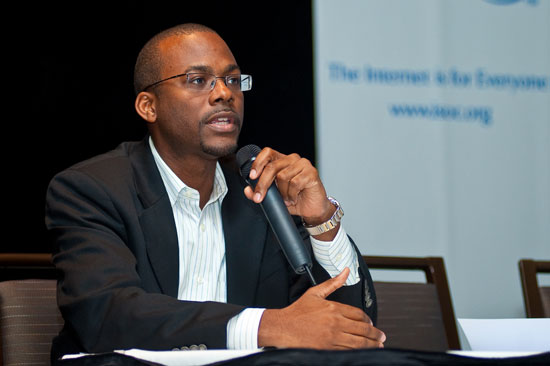 GREAT BAY:--- Regional telecommunications regulators must demonstrate a massive shift in their approach to the regulatory function, if the Caribbean is to take full advantage of the advances in information and communications technology (ICT). Respected Caribbean technology expert, Mr. Bevil Wooding, speaking at the 6th Caribbean Internet Governance Forum in St Maarten, said "Regulators across the region must move to regulating based on clearly articulated development goals".
GREAT BAY:--- Regional telecommunications regulators must demonstrate a massive shift in their approach to the regulatory function, if the Caribbean is to take full advantage of the advances in information and communications technology (ICT). Respected Caribbean technology expert, Mr. Bevil Wooding, speaking at the 6th Caribbean Internet Governance Forum in St Maarten, said "Regulators across the region must move to regulating based on clearly articulated development goals".Wooding, Chief Knowledge Officer of international non-profit, Congress WBN stated "The philosophy underpinning regulation in the Caribbean has to evolve from a liberalization model to a model that better supports innovation and social and economic development".
Citing examples from St Maarten, Belize and Guyana, speakers at the regional event highlighted the unevenness of the Caribbean telecommunications landscape. Some countries, like Belize, still block common internet-based communications tools such as Skype which are based on a technology known as Voice over IP (VoIP). In other countries, the cost of internet services is so prohibitive that most consumers cannot afford the high-speed or broadband connections that are so common in other parts of the world.
Speaking on the topic The Elusive Information Society, Mr. Wooding's presentation highlighted some of the key issues developing states need to overcome if they are to realize the benefits of the internet age.
According to Mr. Wooding, "A new form of digital divide is emerging in terms of the difference in quality and speed of access to ICT in developing countries." He highlighted the fact that in developed, high-income economies, the average cost of a broadband connection is significantly less than in developing countries, both in nominal terms and as a percentage of the average monthly income.
Bernadette Lewis, Secretary General of the Caribbean Telecommunications Union highlighted the absence of hard data in the region that could provide the indicators needed to measure progress towards achieving the development targets. "There is still limited awareness of benefits of information and communications technology among government officials and key decision makers in the region. The Caribbean ICT Roadshow is our response to this challenge", Ms Lewis added that the Roadshow is designed to raise public awareness and to educate on these ICT issues.
The Caribbean Internet Governance Forum is being held in conjunction with the St. Maarten ICT Week currently underway at the Westin Dawn Beach Resort and Spa. The event has attracted a high profile cast of international speakers and admission is open to the general public at no cost.
"Information and the appropriation, dissemination, consumption and control of information have become central to the organisation of society, the economy and our individual experience." Ms. Lewis stated. She also emphasized that citizens of St. Maarten should avail themselves of this opportunity to learn how information and communication technologies may transform, lives institutions and Caribbean societies.
About Bevil Wooding.
Bevil Wooding is a technology pioneer in the Caribbean, and a strong advocate for the use of Internet technologies in industrializing nations. He has facilitated seminars and workshops on e-government, ICTs and national development and in the US, Africa, Europe and the Caribbean. A tireless technology evangelist, Wooding works with US-based non-profit research organization, Packet Clearing House to the design capacity building workshops and support critical internet infrastructure for Governments, ISPs, policy-makers, and research communities regionally and internationally.
As Chief Knowledge Officer at Trinidad-based non-profit, Congress WBN (C-WBN), Wooding's reach extends far beyond his home base. C-WBN operates in over 95 countries, assisting organizations in the private, public and non-profit domain to leverage the power of ICTs. C-WBN is focused on nations-development programs, and Wooding is responsible for technology component of this mandate. An authentic Technology Ambassador, Wooding has been a strong advocate in developing countries for the adoption of Internet and internet-based technologies as a tool for government, corporate and social transformation.
The unique perspective afforded to Wooding through his global responsibilities has made him a sought after resource and speaker. To keep his finger on the evolving pulse-beat of technological change, he continues to work with governments and the private sector to directly shape and direct e-government implementations, information management, business process design and ICT service delivery strategy.









